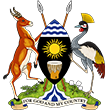![]()
Religion & Beliefs
Uganda is characterized by a diversity of religious beliefs and practices. The findings of the 2014 Census indicate that Catholics are the largest religious denomination constituting close to 40% of the population followed by Anglicans with 32% and Moslems with about 14%. Together these denominations account for more than 80% of the total population.
Of the Christian population, the Roman Catholic Church has the largest number of followers, followed by the Anglican Church, while Evangelical and Pentecostal churches claim the rest. The Muslim population is primarily Sunni. Traditional indigenous beliefs are practiced in some rural areas and are sometimes blended with or practiced alongside Christianity or Islam. Indian nationals are the most significant immigrant population; members of this community are primarily Ismaili (Shi'a Muslim followers of the Aga Khan) or Hindu. The northern and West Nile regions are predominantly Catholic, while Iganga District in eastern Uganda has the highest percentage of Muslims. Judaism is practiced in Uganda by a small number of native Ugandans known as the Abayudaya.The rest of the country has a mix of religious affiliations.
Islam was the first of the exogenous religions to arrive, and it became politically significant in the 1970s. Christianity came during the colonial period through spirited missionary activity—especially in the south, where Catholics were called bafaransa (“the French”) and Protestants bangerezza (“the British”).
In the early 1930s a breakaway group of Anglican missionaries together with several Ugandans initiated the balokole (“born again”) revival, which spread throughout eastern Africa and beyond and has remained a powerful force of Pentecostalism in Uganda.
Until 1972, when Asians were expelled from Uganda, large numbers of Sikhs and Hindus lived throughout the country; in recent years, with returning South Asian practitioners, Sikhism and Hinduism have been reestablished in the country. Freedom of religion is guaranteed by the 1995 constitution.

